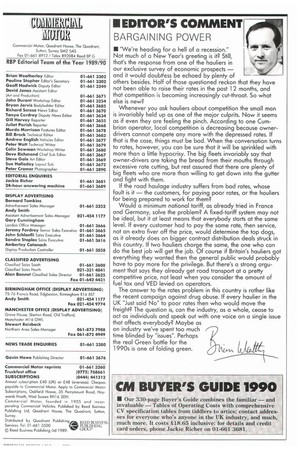BARGAINING POWER
Page 5

If you've noticed an error in this article please click here to report it so we can fix it.
• "We're heading for a hell of a recession." Not much of a New Year's greeting is it? Still, that's the response from one of the hauliers in our exclusive survey of economic prospects — and it would doubtless be echoed by plenty of others besides. Half of those questioned reckon that they have not been able to raise their rates in the past 12 months, and that competition is becoming increasingly cut-throat. So what else is new?
Whenever you ask hauliers about competition the small man is invariably held up as one of the major culprits. Now it seems as if even they are feeling the pinch. According to one Cumbrian operator, local competition is decreasing because ownerdrivers cannot compete any more with the depressed rates. If that is the case, things must be bad. When the conversation turns to rates, however, you can be sure that it will be sprinkled with more than a little hypocrisy. The big fleets invariably say that owner-drivers are taking the bread from their mouths through excessive rate cutting, but rest assured that there are plenty of big fleets who are more than willing to get down into the gutter and fight with them. If the road haulage industry suffers from bad rates, whose fault is it — the customers, for paying poor rates, or the hauliers for being prepared to work for them? Would a minimum national tariff, as already tried in France and Germany, solve the problem? A fixed-tariff system may not be ideal, but it at least means that everybody starts at the same level. If every customer had to pay the same rate, then service, not an extra fiver off the price, would determine the top dogs, as it already does on bigger contract distribution deals struck in this country. If two hauliers charge the same, the one who can do the best job will get the job. Of course if Britain's hauliers got everything they wanted then the general public would probably have to pay more for the privilege. But there's a strong argument that says they already get road transport at a pretty competitive price, not least when you consider the amount of fuel tax and VED levied on operators.
The answer to the rates problem in this country is rather like the recent campaign against drug abuse. If every haulier in the UK "Just said No" to poor rates then who would move the freight? The question is, can the industry, as a whole, cease to act as individuals and speak out with one voice on a single issue that affects everybody? Maybe as an industry we've spent too much time blinded by "issues". Perhaps the real Green battle for the 1990s is one of folding green.








































































































